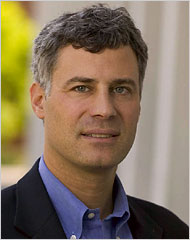Assistant Secretary for Economic Policy and Chief Economist for the U.S. Department of Treasury
Alan B. Krueger, who advised two presidents and helped lead economics toward a more scientific approach to research and policymaking, was found dead on Saturday at his home in Princeton, N.J. He was 58. The cause was suicide, according to a statement by his family released by Princeton University, where Mr. Krueger taught for more than three decades. Mr. Krueger was perhaps best known for his work in the early 1990s on the effects of the minimum wage, in collaboration with Lawrence Katz and another economist, David Card. Alan B. Krueger was confirmed by the U.S. Senate as Assistant Secretary for Economic Policy and Chief Economist for the U.S. Department of Treasury on May 6, 2009. He advises the Secretary on all aspects of economic policy, including current and prospective macroeconomic developments and the development and analysis of the Administration’s economic initiatives. He is currently on leave from Princeton University where he is the Bendheim Professor of Economics and Public Affairs at Princeton University, where he has held a joint appointment in the Economics Department and the Woodrow Wilson School since 1987. In 1994-95 Mr. Krueger served as chief economist at the U.S. Department of Labor. Mr. Krueger has published widely on the economics of education, unemployment, income distribution, social insurance, regulation, terrorism, interest rates and the environment. He has been a research associate of the National Bureau of Economic Research, a member of the editorial board of Science, and has served as chief economist for the Council for Economic Education. He is the author of What Makes A Terrorist: Economics and the Roots of Terrorism and Education Matters: A Selection of Essays on Education, and co-author of Myth and Measurement: The New Economics of the Minimum Wage and of Inequality in America: What Role for Human Capital Policies? Prior to assuming his current position, Mr. Krueger was a member of the Board of Directors of the Russell Sage Foundation, the MacArthur Foundation and the American Institutes for Research. He was named a Sloan Fellow in Economics in 1992 and an NBER Olin Fellow in 1989-90. He was elected a Fellow of the Econometric Society in 1996, a Fellow of the Society of Labor Economists in 2005 and a member of the Executive Committee of the American Economic Association in 2004. He was awarded the Kershaw Prize by the Association for Public Policy and Management in 1997 (for distinguished contributions to public policy analysis by someone under the age of 40) and the Mahalanobis Memorial Medal by the Indian Econometric Society in 2001. In 2002 he was elected a Fellow of the American Academy of Arts & Sciences, and in 2003 he was elected a Fellow of the American Academy of Political and Social Science. He was awarded the IZA Prize in Labor Economics with David Card in 2006. From March 2000 to February 2009 he was a regular contributor to the "Economic Scene" and Economix blog in The New York Times. Mr. Krueger received a B.S. degree, with honors, from Cornell University’s School of Industrial & Labor Relations in 1983, an A.M. in Economics from Harvard University in 1985, and a Ph.D. in Economics from Harvard University in 1987. He is married and has two teenage children.
